Here’s What Big Dinner Parties Are For
Read on to learn about my most controversial Instagram post to date. For some reason.
A Note for You, If You’re Having A Bad Day
Hi My Friend,
It’s the season of Big Dinners. Did you have one last Thursday? Will you have one later in the year? What are your thoughts on them?
Historically, I have mostly hated a dinner party. I find them terrifying. It’s difficult not to take on the burden of everyone else’s happiness. But that’s only part of it; there’s also the important layer of everyone thinking that I, specifically, am charming, interesting, funny, and worthwhile to be around. I end up wanting so badly to be liked that I come off as unlikeable — seeming non-present while I’m thinking about ways to make the conversation fun, or ways to ensure that everyone has all the hummus they want at any given moment.
These self-imposed rules of How To Be At A Gathering are so stressful, that I often just don’t go. Until recently, that is; when I realized that these rules are bogus. No one else really needs me to follow them! So I posted on Instagram about this (in my typical second-person), and NOT EVERYONE WAS HAVING IT. My Instagram posts are rarely controversial (I am kind of cowardly and don’t post my spiciest opinions), so I felt surprised by and interested in the backlash. In case you missed the post (and don’t want to click through Instagram), here are the slides.
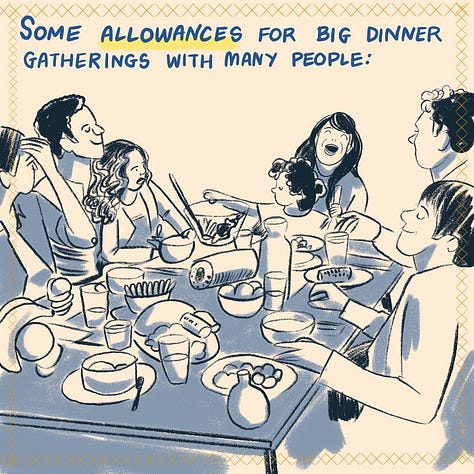
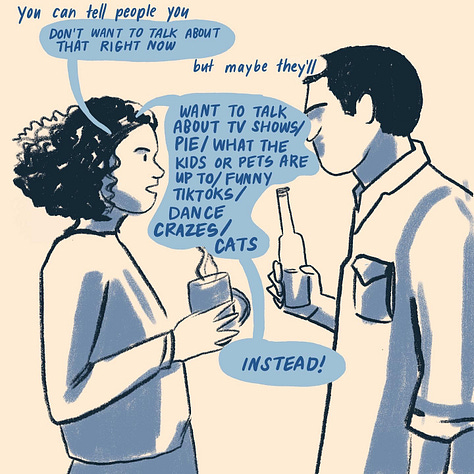
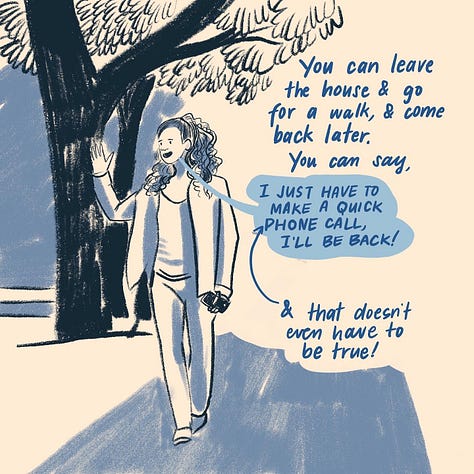
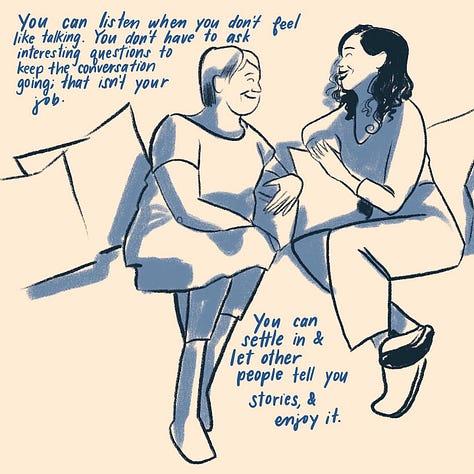
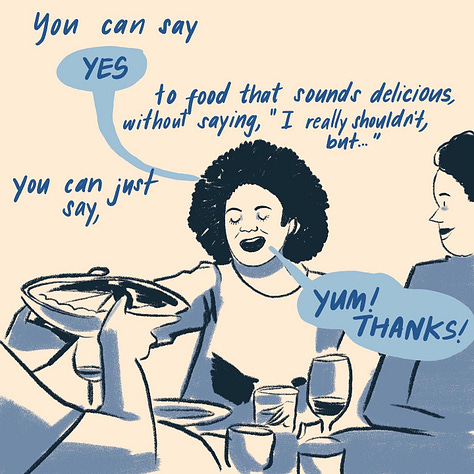
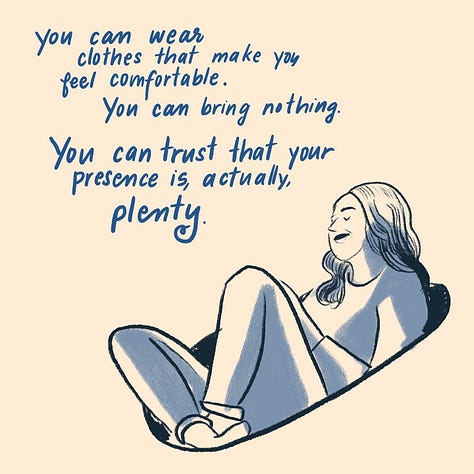
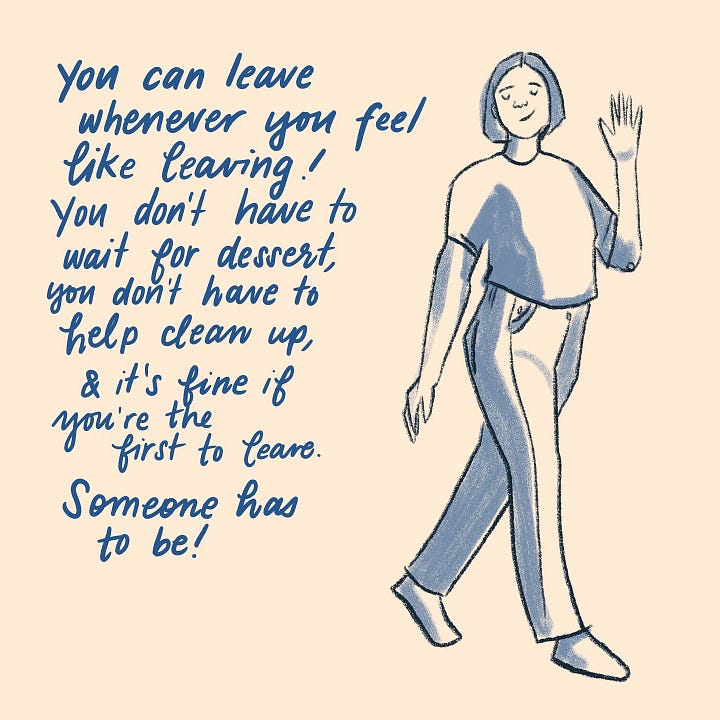
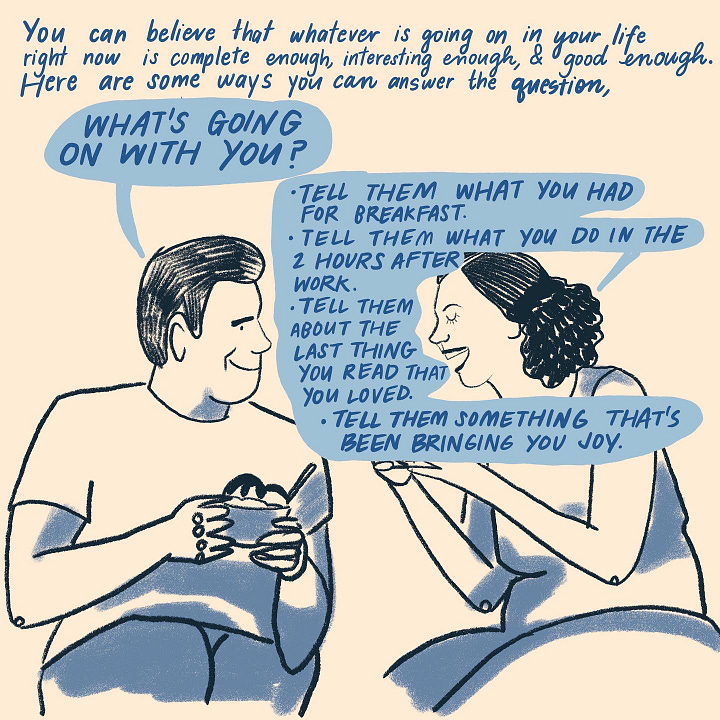
People had so many loud feelings about this post that I had to add the following edits, which I felt should have gone without saying:
EDIT: a lot of folks in the comments reminding us that it’s wonderful to help out at a big gathering, and I agree! If you have the capacity, help! If you don’t, it’s ok. Showing up and being present is enough. Showing community by bringing food and helping clean is also wonderful. There are many ways to have dinner together. If you’re anxious, it can help to remember that some things are not necessarily requirements. That doesn’t make them unimportant; it makes them unrequired.
SECOND EDIT: Whoa! I didn’t know this was going to be so controversial! If you’re not sure about etiquette, the number one rule is to communicate clearly! A text the day before: “I’m so excited to come to your house to eat Thursday! Thank you for the generous invitation. I’ve been really swamped lately and I don’t think I can bring anything this time. I hope that’s ok! I’m hopeful that I’ll have more capacity in the future.” Or: “I can’t wait to see you all tomorrow! I might need to slip out a little early, and I wanted to let you know in advance. If there’s anything I can do to help out during the party, don’t hesitate to ask!”
I couldn’t help but notice that the detractors were almost entirely female-presenting. That makes sense on a statistical level — according to Instagram, 87 percent (!!!) of my followers are female. (Instagram doesn’t provide information about nonbinary users.) But this particular post reached mostly non-followers (79,933 of them, as of this writing) and I don’t have gender demographics on the non-follower makeup. I was socialized female, and I also internalized how rude and terrible it would be if you showed up at a dinner without a hostess gift; if you left without helping to clean; if you didn’t wear clothes that showed respect for the caliber of the event. I can’t count the number of times I have completely foregone going to an event because I was worried I’d be too late or leave too early or didn’t get a bottle of wine in time. But as a host, it is so clear to me: just showing up is incredibly meaningful. If I loved you enough to invite you, I will love the fact that you made it out your door to come through mine. Of course that would be enough. Of course!
Have you ever read an etiquette book? I collect them. I search and scour for them in used bookshops and little free libraries. I am fascinated by the way they’re written (as though they’re permanent, and law) and how often they change (constantly). Nothing makes me giggle quite so much as self-serious humans pretending that they know anything for sure.
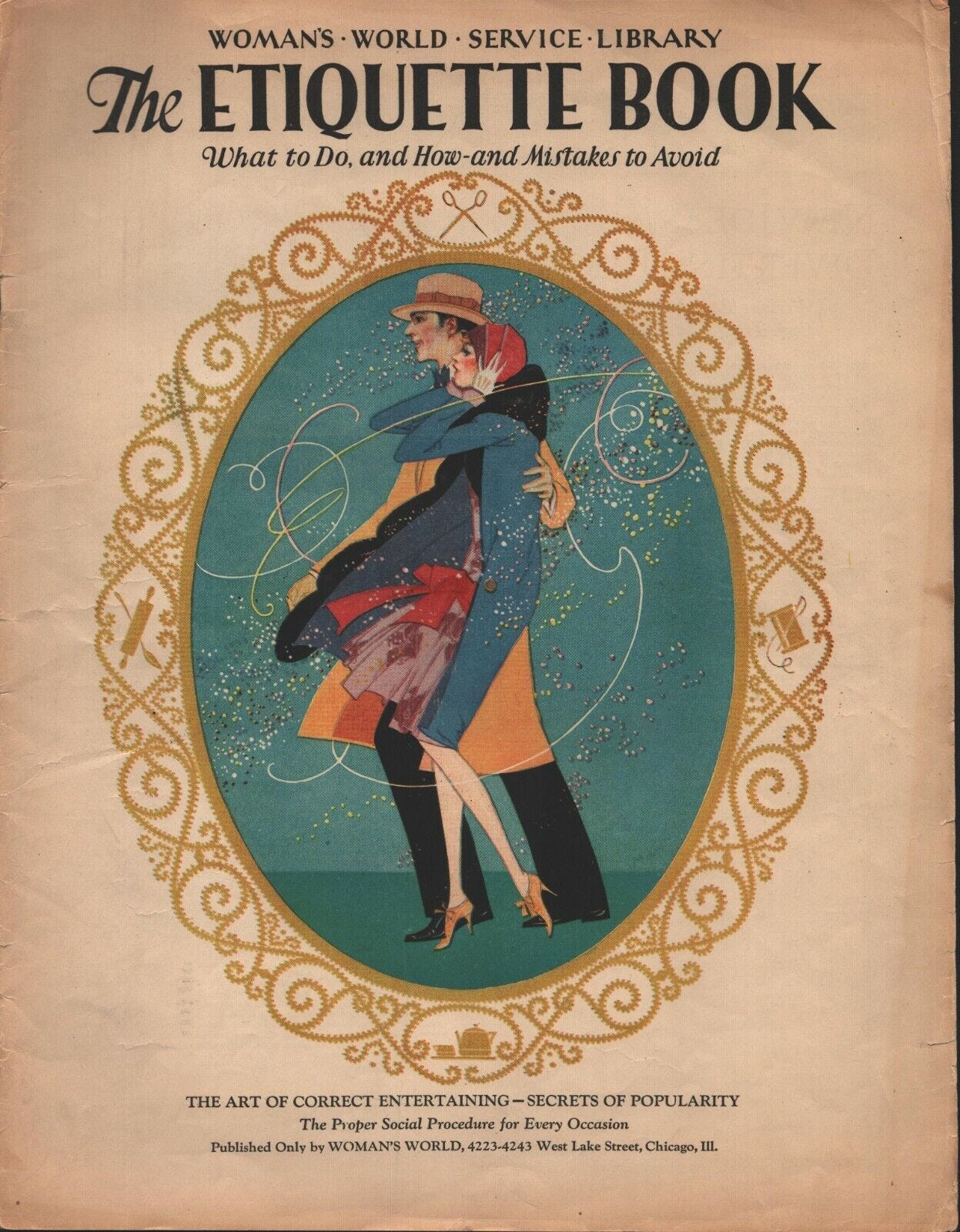
These books always written by women, and almost always FOR women. They’re not terrible! In essence, they say: “Here is how we show each other that we care about each other. There are rules.” I like the first part of this: here is how we show that we care about each other. But (and you must know this!) there AREN’T really rules. The rules are made up! Here are some old ones:
In the 1890s, women weren’t really supposed to give men gifts. They could only give a gift after a man had given the woman a gift first, and then they could not give store-bought gifts, only homemade ones.
A 1940s book said that you should always smile when you’re talking on the phone. (I guess that’s something people can hear?)
The 1957 copy of Emily Post’s etiquette book says that it’s only polite to serve asparagus cut in half: “This avoids the ungraceful appearance of a bent stalk of asparagus falling limply into someone's mouth and the fact that moisture is also likely to drip from the end."
In the 1950s, it was suggested that you don’t converse at all during a meal, so as to keep yourself from eating “too loudly.”
Have you ever heard that a man should escort a woman on his left arm? That’s because in MEDIEVAL TIMES, he needed his sword arm to be free for spontaneous combat. Because also, left-handedness was bad etiquette until the late 20th century.
We SHOULD show that we care about each other — and one of the most important ways you can show that you care about the people in your life is by being honest with them about the things you need. If you’re starting to get that panicky, scraping-the-bottom feeling, consider who in your life would appreciate knowing as much.
This isn’t always (ever?) comfortable — especially for those of us who were socialized to be “good” guests and hosts. I was confronted with this totally directly this Thanksgiving, when, in the midst of hosting, I twisted my ankle. I had brought my daughter outside to look at the chickens, because she was having a difficult time waking up from a nap. I put my foot down weird in a pile of leaves and felt my ankle turn in that way that it’s done since I played a too-fierce game of HORSE in 10th grade gym. (As an aside, I wrote a series of mini-essays about my feet and ankles a few years ago, and you can read them here.) I fell while holding my one-year-old daughter T, who was already crying, and then I started crying, because I couldn’t get up, and what if I had dropped her on her head and she had died? (You’re right, this was unlikely, but in the moment it felt like a sharp possibility.) After Luke came to get T and left again (I had to scream to get him to come outside, since I couldn’t stand up), I sobbed into my fists, watching the whole evening melt away — there could be no serving of pie, no clearing of dishes. I was going to have to crawl back in to the house, drawing all kinds of horrible attention to myself, and then I was going to be stuck in a chair all night, unable to do much hosting or parenting at all. On top of that, my ankle hurt.
My partner Kat came outside. We’ve been dating for five years, and we both cry a LOT, but we don’t usually have complete sobbing meltdowns in front of each other. I didn’t feel like explaining myself, or picking myself up and dusting myself off. I was scared (WHAT IF I’D DROPPED T AND SHE HAD DIED?), and sad (I had such plans for this evening!), and Kat accommodated — she let me bury myself into her armpits (very graceful) and she said, “Ankle stuff is the worst,” with somber understanding. I had wanted to show Kat I cared about her by making her a nice meal; instead, she showed me she cared about ME, and it was more meaningful, probably, than any dinner-based politeness could have been.
This is part of the confusion: we want to be gracious, polite, and bountifully giving. It felt like a TREAT to make dinner for my friends; to show them care by dashing around, filled with the kind of epic hospitality I learned from my own mom. I LOVE how it feels to do this kind of thing. But the universe wasn’t having it this year. So instead, I tried to be a good listener. I couldn’t get up, so I tried to sit with the people I was sitting with in a deeply present way. This is SO difficult for me. Honestly, I would give my performance a C+. (I still wanted the pies to come out at the exact right time, and for everyone to have the right kinds of cups and plates.) But my point is: there are a lot of ways to demonstrate care.
If you are faced with a Big Dinner, I want you to know that it truly is enough to just show up. The best gift you can give to any gathering is to be an active listener — and that doesn’t have to be a difficult thing to do! Look at someone when they’re talking, ask questions as they come to you, enjoy their presence. They’ll enjoy yours. I don’t care what Emily Post says: IT IS ENOUGH. Just showing up is a lot.
And if you need to not show up, that’s OK too. However you are this season, it’s OK. Here’s the bottom line: The purpose of winter Big Dinners is that we need each other, and we belong to each other. The purpose is each other. The Dinners exist so we can feed our real and actual human need for connection and community. Take the bells and whistles as you see fit.
Love,
Sophie
Parenting Paragraph
As T is now toddling, I’m toying with the idea of eliminating this section of the newsletter. What do you think?
The main thing on my mind right now is what I am supposed to be feeding her. It was such a glorious little window where she would eat anything. Now she is discerning. I feel like all parents go through a phase of hoping against hope that their child will not be picky, because there they are, eating strained peas without complaint at six months old. But 13-month T only wants pizza, muffins, peanut butter — the things that all picky eater toddlers want to eat. I already follow the Feeding Littles Instagram account. I am baking vegetables into muffins.
This Week In Sophie
First of all, speaking of Big Dinner etiquette, Sammi and I have a cartoon in this week’s New Yorker:
For this week only, yearly paid subscriptions are 40 (!!!) percent off. All you need is THIS LINK.
You can also get 10 percent off in my online shop by typing the code HIBERNATE10 at checkout. I have new shirts, and new prints, and new cards, and old things, also. Thank you for supporting me. It is because of you that I have the capacity to make this newsletter, and I can’t tell you how grateful I am.

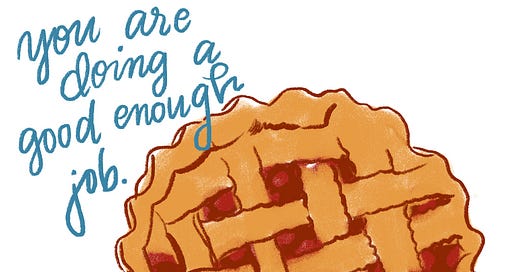






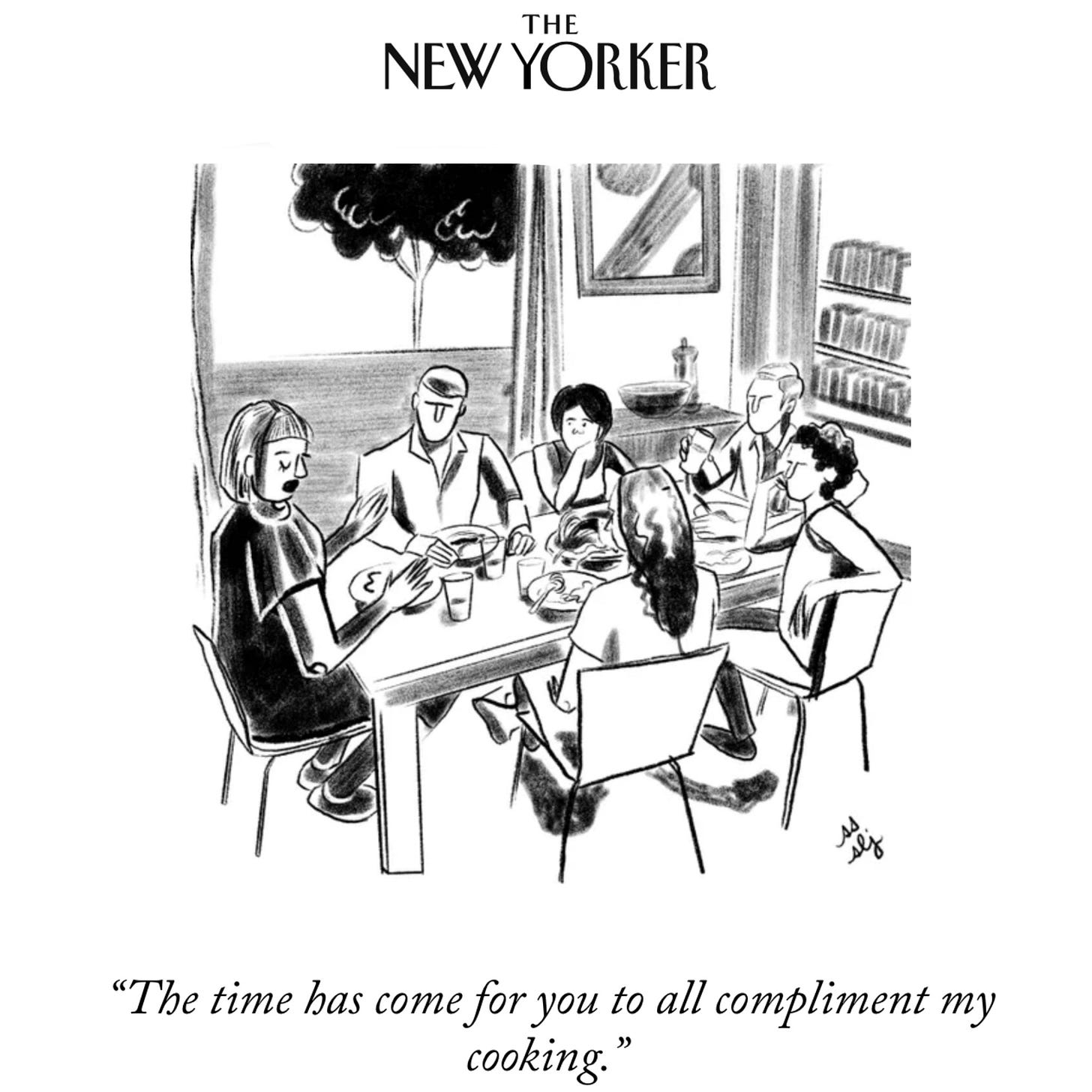
Idk that I’ve ever hosted a Dinner Party. I like the idea but lack the energy. But I have often had friends come over for homemade pizza - I provide the dough and the cheese and guests bring a topping. It’s fun and tasty and not too much work for anyone. Some friends and I were also doing a soup night, where one person made soup, someone else made/brought bread or crackers and the rest of us brought appetizers and/or drinks.
I am currently struggling because I miss this, but I really don’t want to get Covid (at least not more times than I have to) & I’ve been really struggling w figuring out the relative pros and cons. I’m an extroverted introvert and am content w my partner and my pupper for company. But I know that these nights w friends make me really happy and fulfilled in a way I forget about when it’s been a while. But is a night of socializing worth a potentially life-altering infection?? Idk!
And I’m not judging folks for going to/hosting dinner parties. We all have different needs and different risk tolerances. Just something that’s been on my mind a lot.
Clearly, the fact that people were upset about your ideas shows that the socialization of folks to help put on other people's events is strong and deep. I have zero expectations for others to help put on my event, unless it is agreed upon beforehand that it is a collaborative effort, and I hope they extend the same to me. I also think that forced gaiety and forced time together can be as difficult and problematic as forced hugs. I may be a little salty today...